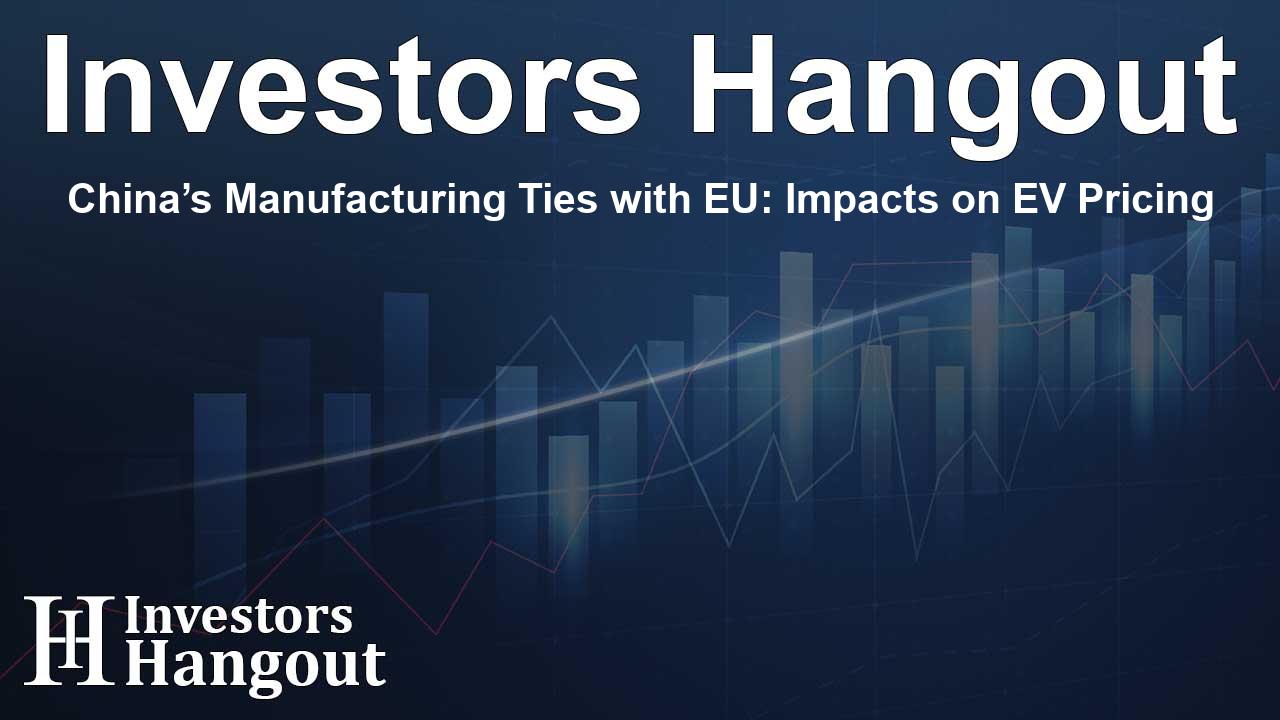China’s Manufacturing Ties with EU: Impacts on EV Pricing

China’s Warning to the European Union on EV Pricing Negotiations
China has recently voiced concerns regarding the European Union's approach to electric vehicle pricing. In a statement from the Ministry of Commerce, the Chinese government has urged the EU not to pursue separate negotiations over the pricing of Chinese-made electric vehicles (EVs) sold within the union. They argue that such actions could undermine the foundation of existing tariff negotiations.
Concerns Raised by the Chinese Government
Chinese officials emphasize that if the EU engages in separate negotiations while simultaneously discussing tariffs with China, it could jeopardize mutual trust and complicate the negotiation process. This statement reflects China's unease regarding the direction of trade talks with the EU, highlighting the delicate nature of international trade relationships.
The Ministry did not provide specific evidence to support its claims about the EU’s negotiations with individual companies. Instead, they referred to unspecified 'relevant reports' that raised alarms about this issue.
Recent Developments in EU-China EV Discussions
These comments come shortly after the EU rejected a Chinese proposal that aimed to establish a minimum price for EVs manufactured in China at 30,000 euros (approximately $32,000). This proposal was seen as a potential avenue to prevent the imposition of tariffs that are currently under consideration. The rejection signals a significant hurdle in the dialogues between China and the EU.
The Role of Manufacturers in the Negotiation Process
Moreover, various manufacturers, including European-owned companies operating in China, have tasked the China Chamber of Commerce for Machinery and Electronics with proposing a price commitment plan. This plan aims to reflect the overarching stance of the industry regarding EV pricing.
The Chinese Ministry of Commerce indicated that these proposals serve as the basis for ongoing consultations between China and the EU, emphasizing a collective industry position that could influence future outcomes.
The Broader Implications for Trade Relations
The situation reflects a complex interplay of international trade dynamics, where the price of goods, especially in industries experiencing rapid growth like electric vehicles, can lead to significant diplomatic ramifications. China's call for unified negotiations illustrates the importance it places on strategic partnerships and the integrity of trade discussions.
Looking Ahead: The Future of EU-China Relations
As the two powers navigate these discussions, the importance of maintaining open lines of communication cannot be overstated. The outcome of these negotiations could reshape the future of electric vehicle pricing in the EU and impact the broader trade landscape.
With global demand for electric vehicles increasing, both parties have a vested interest in finding a suitable resolution that balances market stability with legislative oversight. The stakes are high as both the EU and China seek to assert their influence in a rapidly evolving industry.
Frequently Asked Questions
What is China’s stance on EV pricing negotiations with the EU?
China has urged the EU not to conduct separate negotiations regarding the pricing of EVs, fearing it could undermine mutual trust in existing tariff discussions.
What recent proposal did China make regarding EV prices?
China proposed that Chinese-made EVs be sold within the EU at a minimum price of 30,000 euros to avoid impending tariffs.
Why did the EU reject China’s proposal on EV pricing?
The rejection indicates a significant tension in trade discussions and a lack of consensus on how to manage pricing and tariffs for electric vehicles.
What role do manufacturers play in these negotiations?
Manufacturers have engaged the China Chamber of Commerce to propose a price commitment plan that represents the industry’s collective interests in negotiations.
What are the potential impacts of these negotiations on future trade relations?
The outcomes of these negotiations could significantly influence trade dynamics between China and the EU, especially concerning the burgeoning electric vehicle market.
About Investors Hangout
Investors Hangout is a leading online stock forum for financial discussion and learning, offering a wide range of free tools and resources. It draws in traders of all levels, who exchange market knowledge, investigate trading tactics, and keep an eye on industry developments in real time. Featuring financial articles, stock message boards, quotes, charts, company profiles, and live news updates. Through cooperative learning and a wealth of informational resources, it helps users from novices creating their first portfolios to experts honing their techniques. Join Investors Hangout today: https://investorshangout.com/
Disclaimer: The content of this article is solely for general informational purposes only; it does not represent legal, financial, or investment advice. Investors Hangout does not offer financial advice; the author is not a licensed financial advisor. Consult a qualified advisor before making any financial or investment decisions based on this article. The author's interpretation of publicly available data shapes the opinions presented here; as a result, they should not be taken as advice to purchase, sell, or hold any securities mentioned or any other investments. The author does not guarantee the accuracy, completeness, or timeliness of any material, providing it "as is." Information and market conditions may change; past performance is not indicative of future outcomes. If any of the material offered here is inaccurate, please contact us for corrections.